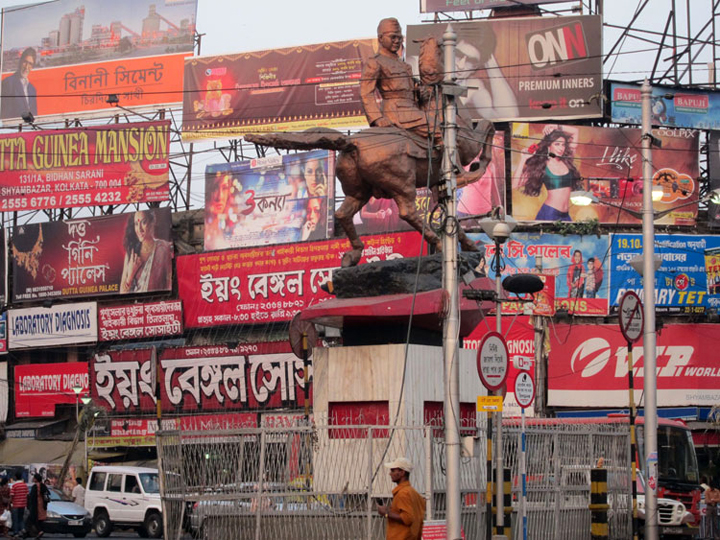
SASNET News
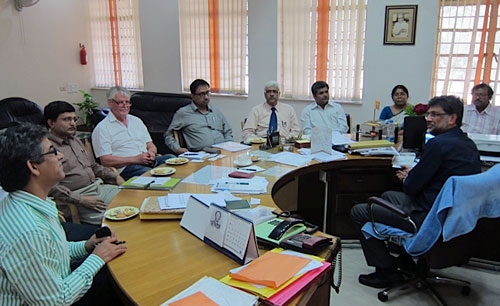 During the period 20 October till 30 November 2012, SASNET deputy director Lars Eklund has been away from the SASNET office at Lund University.
During the period 20 October till 30 November 2012, SASNET deputy director Lars Eklund has been away from the SASNET office at Lund University.
Lars has enjoyed some free time with his family in Kolkata, interspersed with festivals, musical performances and other cultural activities including a wedding, but he has of course also interacted with SASNET networking partners at the prime universities in Kolkata – Calcutta University, Jadavpur University, and Indian Institute of Management (IIM) Calcutta. (Photo from meeting with Jadavpur University Vice Chancellor Souvik Bhattacharya, and Heads of departments on November 26th.)
 Lars set up a small SASNET office at his Sardar Sankar Rd residence in Kolkata (photo). During the period 27 October – 5 November he worked for SASNET, making a contact journey to Varanasi, Kanpur and Delhi, with visits to the Swedish study centres in Varanasi, the Banaras Hindu University (BHU), IIT Kanpur, the South Asian University in Delhi, and other networking partners. In Delhi, he participated in the sixth Nobel Memoria Week, organised by the Swedish Embassy, and had meetings with the Ambassador Harald Sandberg, and the Growth Analysis representative Andreas Muranyi. In mid-November, Lars also visited Kathmandu for five days, and meetings were organised at Tribhuvan University, and meetings with Nepalese nertworking partners. Detailed reports on all meetings are now gradually posted on SASNET, go for the page.
Lars set up a small SASNET office at his Sardar Sankar Rd residence in Kolkata (photo). During the period 27 October – 5 November he worked for SASNET, making a contact journey to Varanasi, Kanpur and Delhi, with visits to the Swedish study centres in Varanasi, the Banaras Hindu University (BHU), IIT Kanpur, the South Asian University in Delhi, and other networking partners. In Delhi, he participated in the sixth Nobel Memoria Week, organised by the Swedish Embassy, and had meetings with the Ambassador Harald Sandberg, and the Growth Analysis representative Andreas Muranyi. In mid-November, Lars also visited Kathmandu for five days, and meetings were organised at Tribhuvan University, and meetings with Nepalese nertworking partners. Detailed reports on all meetings are now gradually posted on SASNET, go for the page.

On 25 October 2012, SASNET Director Anna Lindberg was invited to give a talk at the Centre for South Asian Studies at the University of Edinburgh, as part of their weekly seminar series. She spoke to faculty members and students on the topic, “Can There Be Dowry in Progressive Kerala?” The illustrated talk was followed by a lively discussion session. Dr. George Palattiyil of the School of Social Work at Edinburgh University chaired the session. Professor Roger Jeffery, Chair of the European Association for South Asian Studies, also participated.
The Centre for South Asian Studies in Edinburgh is a highly reputed center attracting students from all over the world to their programs at the undergraduate, masters, and Ph.D. levels. Two of those students, Supurna Banerjee and Deborah Menezes, had participated in a Ph.D. workshop organized by SASNET in September 2012.
A synopsis of the seminar can be found here.

 On October 23 2012, Rina Sunder Sand, founder and Chief Executive Officer (CEO) of the organisation EnteringINDIA visited SASNET to discuss the possibilities for future collaborations. As a native Indian raised in Norway, fluent in Hindi, Punjabi and Norwegian, Rina is equally at home in the Indian culture as in Scandinavia. Her cross-cultural insights led her to found EnteringINDIA, through which she provides cultural workshops and coaching for Scandinavian companies wishing to do business in India.
On October 23 2012, Rina Sunder Sand, founder and Chief Executive Officer (CEO) of the organisation EnteringINDIA visited SASNET to discuss the possibilities for future collaborations. As a native Indian raised in Norway, fluent in Hindi, Punjabi and Norwegian, Rina is equally at home in the Indian culture as in Scandinavia. Her cross-cultural insights led her to found EnteringINDIA, through which she provides cultural workshops and coaching for Scandinavian companies wishing to do business in India.
Rina has held several highly appreciated lectures and workshops in the past on those matters and we look forward to cooperating with her on future events here at Lund University. See EnteringINDIA’s website at www.enteringindia.com.

 Former Swedish Ambassador to Pakistan and Afghanistan, Ann Wilkens, held a well attended lecture on “Women, Peace, and Security in Afghanistan” at Domkyrkoforum in Lund on 14 November 2012. The seminar was organised by SASNET in collaboration with the Lund Afghanistan Committee and Sensus Studieförbund.
Former Swedish Ambassador to Pakistan and Afghanistan, Ann Wilkens, held a well attended lecture on “Women, Peace, and Security in Afghanistan” at Domkyrkoforum in Lund on 14 November 2012. The seminar was organised by SASNET in collaboration with the Lund Afghanistan Committee and Sensus Studieförbund.
Ann Wilkens is currently a member of the advisory panel of the Afghanistan Analysts Network and the author of a number of papers on the Pakistan/Afghanistan region, including “Missing the Target: A report on the Swedish Commitment for Women, Peace, and Security in Afghanistan”, which has just been published online.
Ambassador Wilkens began with a detailed summary of the newly-released report, followed by a brief question-and-answer session. She then presented a broader backdrop to the difficulties facing the region, explaining the multi-ethnic composition of Afghanistan, the roles played by neighbouring countries, and other factors creating a complex challenge to military and civilian forces working to develop peace and security for the country and its marginalized women. A second lively question-and-answer session concluded the evening. Read more.

 Associate Professor Jan Magnusson, School of Social Work, Lund University, held an inspired SASNET lunch lecture on ”The Baltistan Movement and the Political Power of Pop Ghazals”, November 15, 2012 at Lunds konsthall.
Associate Professor Jan Magnusson, School of Social Work, Lund University, held an inspired SASNET lunch lecture on ”The Baltistan Movement and the Political Power of Pop Ghazals”, November 15, 2012 at Lunds konsthall.
 SASNET organises Brown Bag lunch seminars in collaboration with ABF, Sweden’s largest adult liberal education association, and the municipal art gallery of Lund (Lunds konsthall). As usual, lectures are given by eminent Lund University researchers working on South Asia related projects, and are held once a month on Thursdays. Programme for the fall 2012 (as a pdf-file).
SASNET organises Brown Bag lunch seminars in collaboration with ABF, Sweden’s largest adult liberal education association, and the municipal art gallery of Lund (Lunds konsthall). As usual, lectures are given by eminent Lund University researchers working on South Asia related projects, and are held once a month on Thursdays. Programme for the fall 2012 (as a pdf-file).
Dr Magnusson talked about his research on the political role of pop ghazal music in Baltistan, a region in the western Himalayas characterized by its blend of Muslim Shi’ite and Tibetan culture, and its vernacular Tibetan dialect. Read more about Jan’s lecture.

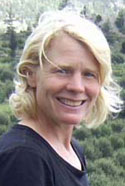 Dr. Andrea Nightingale from the School of Global Studies, University of Gothenburg, held a highly interesting SASNET/UPF lecture on ”‘Naya’ Nepal? The practices and challenges of local democracy in the Federal Republic of Nepal” on November 21, 2012. The seminar was jointly organised by SASNET and the Association of Foreign Affairs at Lund University (UPF).
Dr. Andrea Nightingale from the School of Global Studies, University of Gothenburg, held a highly interesting SASNET/UPF lecture on ”‘Naya’ Nepal? The practices and challenges of local democracy in the Federal Republic of Nepal” on November 21, 2012. The seminar was jointly organised by SASNET and the Association of Foreign Affairs at Lund University (UPF).
From 1 October 2012, Andrea Nightingale works at the Human Ecology section at the School of Global Studies, University of Gothenburg. In her presentation, she pointed out that Nepal is at a turning point as it emerges from violent conflict (1996-2006) to write a new constitution (2008-present) and establish a federated Republic. Everywhere, people from all different backgrounds insist that democracy cannot arrive without equality, and they referred to gender, caste, ethnic equality and opportunities for employment as the domains requiring particular reform. In the present context there are real struggles for authority as this ‘new’ consciousness intersects with older and new forms of patronage. Read more.
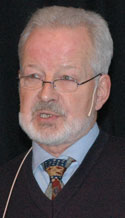
 SASNET, together with The Swedish Committee for Afghanistan (SCA) in Lund, and Sensus studieförbund, organised a lecture on “Afghanistan: The current situation and the future beyond 2014”, with one of Sweden’s foremost experts on Afghanistan, Anders Fänge, on Thursday, November 29, at 18:00. It took place at Lunds stadsbibliotek (Lund City Library), in the Atriumgården.
SASNET, together with The Swedish Committee for Afghanistan (SCA) in Lund, and Sensus studieförbund, organised a lecture on “Afghanistan: The current situation and the future beyond 2014”, with one of Sweden’s foremost experts on Afghanistan, Anders Fänge, on Thursday, November 29, at 18:00. It took place at Lunds stadsbibliotek (Lund City Library), in the Atriumgården.
 Fänge, a journalist and long-standing manager of the Swedish Committee for Afghanistan, is among Sweden’s foremost experts on Afghanistan. He was one of the first journalists who reported from that country after the Soviet invasion in 1979 and has since been involved in humanitarian activities in Afghanistan and has reported on the often very severe living conditions of the Afghan people. In his role as a manager of the Swedish Committee for Afghanistan, Fänge has been a pioneer in developing its projects in agriculture, healthcare, and education, and has been adriving force behind the functional nationwide school system in Afghanistan today. He has also been engaged in securing education for girls and women. In addition to Afghanistan, he has also worked over the past 30 years in Ethiopia for Save the Children, in Central Asia for the Red Cross, and in Somalia and the West Bank for the UN. He holds an honorary doctorate from Umeå University.
Fänge, a journalist and long-standing manager of the Swedish Committee for Afghanistan, is among Sweden’s foremost experts on Afghanistan. He was one of the first journalists who reported from that country after the Soviet invasion in 1979 and has since been involved in humanitarian activities in Afghanistan and has reported on the often very severe living conditions of the Afghan people. In his role as a manager of the Swedish Committee for Afghanistan, Fänge has been a pioneer in developing its projects in agriculture, healthcare, and education, and has been adriving force behind the functional nationwide school system in Afghanistan today. He has also been engaged in securing education for girls and women. In addition to Afghanistan, he has also worked over the past 30 years in Ethiopia for Save the Children, in Central Asia for the Red Cross, and in Somalia and the West Bank for the UN. He holds an honorary doctorate from Umeå University.
Recently returned from Afghanistan, Anders shared his thoughts and reflections on the current situation in the country, and how its development might look beyond the year 2014. See seminar poster (in Swedish).
• Emily Baird lectured on Indian and Swedish research cultures in comparision


Assistant Professor Emily Baird from Lund Vision Group, Dept. of Biology, Lund University, held an interesting SASNET lunch seminar talk on Thurday 6th December 2012 on ”Swedish-Australian perspectives on research collaboration with India”. Dr. Baird is involved in an exciting research project on the aerobatic maneuvers of insects, more exactly bumble-bees, a project carried out in collaboration with the the National Centre for Biological Sciences, Tata Institute of Fundamental Research in Bangalore (more information about the project).
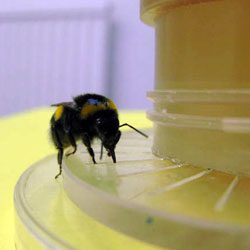 The frequent interactions between researchers from Asia and Europe, both in Lund and in Bangalore, has given not ony interesting scientific results, but also gave an interesting insight into how culture affects approaches to scientific research. Given Dr. Baird’s experience of being a researcher in both Australia and Sweden, this insight has helped her to have a broad understanding of research culture in different environments and to identify both advantages and shortcomings of different approaches. She gave a lot of examples of differences in attitude to time, space, social life and scientific work, examples that the audience appreciated. Read more.
The frequent interactions between researchers from Asia and Europe, both in Lund and in Bangalore, has given not ony interesting scientific results, but also gave an interesting insight into how culture affects approaches to scientific research. Given Dr. Baird’s experience of being a researcher in both Australia and Sweden, this insight has helped her to have a broad understanding of research culture in different environments and to identify both advantages and shortcomings of different approaches. She gave a lot of examples of differences in attitude to time, space, social life and scientific work, examples that the audience appreciated. Read more.
It was the final and concluding lecture in SASNET’s Brown Bag lunch seminar series for the fall semester of 2012, organised in collaboration with Arbetarnas Bildningsförbund (ABF) Lund, and Lunds konsthall. The lectures are given by eminent Lund University researchers working on South Asia related projects, and are held once a month on Thursdays. A new series of lunch seminars will be held during the spring semester 2013, first out will be Dr. Per Wickenberg, Division of Sociology of Law, who will speak on Thursday 7 February.
• More information about SASNET and its activities
See SASNET’s page, http://www.sasnet.lu.se/sasnet-news
Research Community News

 A Result Based Management Seminar on ”Scaling-up safe water access and future strategy for policy and implementation for Sustainable Arsenic Mitigation in Bangladesh” was held in Dhaka on 12th and 14th December 2012. It was jointly organized by the Policy Support Unit (PSU) of Local Government Division, Ministry of Local Government, Rural Development and Cooperatives, Government of Bangladesh; and the Swedish Sida-SASMIT Project Consortium, led by the KTH-International Groundwater Arsenic Research Group(Professors Prosun Bhattacharya and Gunnar Jacks) at the Royal Institute of Technology (KTH) in Stockholm.
A Result Based Management Seminar on ”Scaling-up safe water access and future strategy for policy and implementation for Sustainable Arsenic Mitigation in Bangladesh” was held in Dhaka on 12th and 14th December 2012. It was jointly organized by the Policy Support Unit (PSU) of Local Government Division, Ministry of Local Government, Rural Development and Cooperatives, Government of Bangladesh; and the Swedish Sida-SASMIT Project Consortium, led by the KTH-International Groundwater Arsenic Research Group(Professors Prosun Bhattacharya and Gunnar Jacks) at the Royal Institute of Technology (KTH) in Stockholm.
The second day consisted of an inauguration of safe drinking water tubewells installed by SASMIT project in Matlab region, four hours drive away from Dhaka. In this very ordinary ceremony there was participation from Policy Support Unit (PSU), Embassy of Sweden in Dhaka, SASMIT Project, LGIs and local people from Matlab. This event took place at the premise of the house where SASMIT-148 tubewell has been installed. Read more.
• Swedish Research Council grants to South Asia related projects

 In late October 2012, the Swedish Research Council decided upon project grants for the period 2013-15, in a few cases even to 2017. Some of the projects to be given funding concerns South Asia related research. SASNET has picked them out for you:
In late October 2012, the Swedish Research Council decided upon project grants for the period 2013-15, in a few cases even to 2017. Some of the projects to be given funding concerns South Asia related research. SASNET has picked them out for you:
– Professor Ann-Mari Svennerholm, Department of Microbiology and Immunology, Institute of Biomedicine at Sahlgrenska Academy, University of Gothenburg, was granted SEK 4.95 m for continued research on vaccines against e-coli and heliobacter. Project name: Studies towards development of vaccines against ETEC and H. pylori for use in developing countries.
– Professor Cecilia Stålsby Lundborg, Division of Global health (IHCAR), Karolinska Institutet, was granted SEK 5.25 (for five years!) for her continued research on Use of Antibiotics in India. Project name: Antibiotic stewardship program including infection prevention and control and waste water treatment – Implementation research in hospital and community in India.
– Associate Professor Per-Anders Forstorp, Culture, Society & Media Production, Department for Studies of Social Change and Culture (ISAK), Linköping University, Campus Norrköping, was granted SEK 4.58 m for a comparative study in Educational Science. Project name: Beyond the national university: Global corporate universities in India, Brazil and Dubai. Research partner: Professor Ulf Mellström, Centre for Gender Studies, Karlstad University.
– Professor Lars Åke Persson, International Maternal and Child Health, Department of Women’s and Children’s Health, Uppsala University, was granted SEK 5.25 m for a follow-up study of the MINIMat Randomised Trial in Bangladesh. Project name: Developmental Origins of Health and Disease: Equitable Prevention Across Generations.
Research partners: Eva-Charlotte Ekström, and Emma Lindström at the same department; Ruchira Naved, Shams Arifeen, Anisur Rahman, Ashraful Khan, and Iqbal Kabir, at ICDDR,B in Dhaka, Bangladesh; and Lars Lindholm, Epidemiology and Global Health, Department of Public Health and Clinical Medicine, Umeå University.
More information, with abstracts.
 Five South Asia related collaborative research projects were selected in the ninth round of the so-called Swedish Research Links (Asian–Swedish research partnership programme) – funded by Sida and the Swedish Research Council.
Five South Asia related collaborative research projects were selected in the ninth round of the so-called Swedish Research Links (Asian–Swedish research partnership programme) – funded by Sida and the Swedish Research Council.
The Swedish Research Links program offers grants for international collaborative research projects of high scientific quality and of mutual relevance for scientists in Sweden and scientists in selected countries in Asia, the Middle East and North Africa, Africa, Latin America and Europe. Eligible countries in South Asia for the 2012 announcement were: Afghanistan, Bangladesh, Nepal, Pakistan, and Sri Lanka (but not India, Bhutan and Maldives). Full information about the programme.
The decisions for the three-year period 2013-15 were taken in November 2012. Two projects will be carried out with partners in Sri Lanka, and one each with partners in Bangladesh, Nepal and Pakistan.
– Anna Godhe, Department of Biological and Environmental Sciences, University of Gothenburg, gets funding for a project on how climate-induced changes in hydrography will affect species of harmful algae, pathogenic bacteria and the inter-relation between those. This will be done by initially isolating relevant species from Sri Lankan coastal water. Collaboration partner: Darshanee Ruwandeepika, Sabaragamuwa University.
– Antonio Barragan, Center for Infectious Medicine, Karolinska Institutet, gets funding for a project on detection of the water-borne parasite Cryptosporidium in Bangladesh and Sweden. Collaboration partner: Md. Shahiduzzaman, Bangladesh Agricultural University.
– Joyanto Routh, Department of Water and Environmental Studies, Tema Institute, Linköping University, gets funding for a project on Monsoon variability and its impact on terrestrial ecosystems in Sri Lanka during the Holocene. Collaboration partner: Rohana Chandrajith, University of Peradeniya.
– Magnus Willander, Division of Physics and Electronics, Department of Science and Technology, gets funding for a project on generating hydrophobe surfaces for improved corrosional and nanomechanical features. Collaboration partner: Zaki Ahmed, COMSATS Institute of Information Technology, Pakistan.
– Rosario Garcia-Gil, Umeå Plant Science Centre (UPSC), Swedish University of Agricultural Sciences (SLU), Umeå, gets funding for a project on identifying genotypes with improved TAXOL. Collaboration partner: Dhurva Prasad Gauchan, Kathmandu University, Nepal.
Go to SASNET’s detailed presentation of the South Asia related projects.

 Ashok Kumar Kaul, Professor of Sociology at Banaras Hindu University (BHU) has been selected to become the first Visiting Indian ICCR Professor at the University of Gothenburg in Sweden. He will join the position in January 2013, and stay for six months. His contact person in Gothenburg is Professor Åke Sander at the Department of Literature, History of Ideas, and Religion. Prof. Kaul has a doctorate from BHU, and thirty years of lecturing and research experience at a number of universities in India and internationally.
Originally coming from Kashmir, Prof. Kaul has written a book entitled ”Kashmir: Fractured Nativity (Closed Options, Open Possibilities)”. It was published by German publisher VDM in 2009, and an edited version “Kashmir: Contested Identity” was published by Rawat Publications in India in 2011. More information about the book.
Ashok Kumar Kaul, Professor of Sociology at Banaras Hindu University (BHU) has been selected to become the first Visiting Indian ICCR Professor at the University of Gothenburg in Sweden. He will join the position in January 2013, and stay for six months. His contact person in Gothenburg is Professor Åke Sander at the Department of Literature, History of Ideas, and Religion. Prof. Kaul has a doctorate from BHU, and thirty years of lecturing and research experience at a number of universities in India and internationally.
Originally coming from Kashmir, Prof. Kaul has written a book entitled ”Kashmir: Fractured Nativity (Closed Options, Open Possibilities)”. It was published by German publisher VDM in 2009, and an edited version “Kashmir: Contested Identity” was published by Rawat Publications in India in 2011. More information about the book.


A three day International Conference on “Religion & Globalization: A Changing Perspective” was held in Kolkata, India, 29 November – 1 December 2012. It was being organised by the Centre for the Study of Religion and Society (CSRS), a unique endeavor of the Dept. of Sociology at Jadavpur University established in 2011 (in collaboration with Swedish researchers at the universities of Gothenburg and Uppsala), the Department of Literature, History of Ideas and Religion, Universty of Gothenburg; and the Forum for South Asian Studies, Uppsala University.
 SASNET’s deputy director Lars Eklund also participated in the conference for the inauguration. The conference convenor was Dr.Ruby Sain, CSRS chairperson.
SASNET’s deputy director Lars Eklund also participated in the conference for the inauguration. The conference convenor was Dr.Ruby Sain, CSRS chairperson.
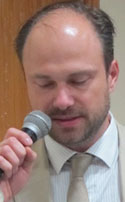

The keynote addresses were delivered by Prof. Åke Sander, University of Gothenburg, who talked about ”Religion and Society: A Global Perspective”; and by Dr. Clemens Cavallin, also from Gothenburg, who talked about ”The Concept of Religion and the Foundation of Religious Studies”.The conference took its point of departure from the coming 150 years anniversary celebration of Swami Vivekananda’s speech at the World Parliament of Religion in Chicago in 1893.
 The Chicago speech became a landmark in the relations between Indic religions and the West. Vivekananda succeeded in creating a platform for interaction between India and the West that opened up the way for others to follow. His venture was based on particular philosophical, intellectual and social audience. The conference invited papers and critical reflections about this and similar processes of religious globalization within a colonial, postcolonial and postmodern context. See the full programme for the conference.
The Chicago speech became a landmark in the relations between Indic religions and the West. Vivekananda succeeded in creating a platform for interaction between India and the West that opened up the way for others to follow. His venture was based on particular philosophical, intellectual and social audience. The conference invited papers and critical reflections about this and similar processes of religious globalization within a colonial, postcolonial and postmodern context. See the full programme for the conference.

 On November 16, 2012, Gunnel Cederlöf, newly installed Professor at the Department of History, Uppsala University, gave an inaugural lecture on the theme “On Time and Space: To Control an Empire with a Map”, about the British Lieutenant Robert Boileau Pemberton’s use and creation of maps over South Asian in the 19th century. Watch the lecture here (in Swedish).
On November 16, 2012, Gunnel Cederlöf, newly installed Professor at the Department of History, Uppsala University, gave an inaugural lecture on the theme “On Time and Space: To Control an Empire with a Map”, about the British Lieutenant Robert Boileau Pemberton’s use and creation of maps over South Asian in the 19th century. Watch the lecture here (in Swedish).
Professor Cederlöf’s work spans the environmental, legal and colonial history of early modern and modern India and the British Empire. It focuses on questions of the formation of governance and subject rights at the time when the British Empire formed in Asia. More specifically it enquires into the role of commerce, law and property, and the enabling and constraining conditions of climate and ecology. She has also taken an interest in the history of mission from the perspective of Indian social and economic history.
Professor Cederlöf chairs the Forum for South Asia Studies at Uppsala University and coordinates the Uppsala University and Calcutta University student and teacher exchange programme.
• New premises for Nordic Institute of Asian Studies

 The Nordic Institute of Asian Studies – NIAS is now located at the social science campus at Copenhagen University. Although the space has been reduced, there is still room for students from the SUPRA program as well as for guest researchers and workspace for MA/PhD students. The ambition is to further develop as an Asian Studies meeting place in the Nordic region. More information.
The Nordic Institute of Asian Studies – NIAS is now located at the social science campus at Copenhagen University. Although the space has been reduced, there is still room for students from the SUPRA program as well as for guest researchers and workspace for MA/PhD students. The ambition is to further develop as an Asian Studies meeting place in the Nordic region. More information.
The new address of NIAS: NIAS- Nordic Institute of Asian Studies, University of Copenhagen, City Campus, Øster Farimagsgade 5, DK – 1353, Copenhagen K, Denmark. Show on map.

 A new Foundation for Applied Political Science of South Asia (APSA), has been conceptualised and created by the members of the Department of Political Science at the Heidelberg University in Germany. APSA aims at promoting scientific research on the South Asian region and seeks to achieve its goals by supporting scholarly work and providing assistance and networks for researchers, while at the same time aiming at raising understanding and awareness for politics and political processes in South Asia. By supporting academics and individual research, APSA not only wants to contribute to the scientific community, but also seeks to provide easily accessible insights into the subcontinent for the general public, the media, and the economy. More information.
A new Foundation for Applied Political Science of South Asia (APSA), has been conceptualised and created by the members of the Department of Political Science at the Heidelberg University in Germany. APSA aims at promoting scientific research on the South Asian region and seeks to achieve its goals by supporting scholarly work and providing assistance and networks for researchers, while at the same time aiming at raising understanding and awareness for politics and political processes in South Asia. By supporting academics and individual research, APSA not only wants to contribute to the scientific community, but also seeks to provide easily accessible insights into the subcontinent for the general public, the media, and the economy. More information.
 A working papers portal named The Himalayan Research Papers Archive (HRPA) has been established by the Nepal Study Center (NSC) at the University of New Mexico’s LoboVault system. HRPA is a working papers archive maintained by the NSC, and submission is open to researchers worldwide. You can follow a few simple steps to upload your research working papers. While not subject to peer review, submissions will be screened by a Production Editor for quality control. An editorial board with members representing all three continents will monitor the portal.
A working papers portal named The Himalayan Research Papers Archive (HRPA) has been established by the Nepal Study Center (NSC) at the University of New Mexico’s LoboVault system. HRPA is a working papers archive maintained by the NSC, and submission is open to researchers worldwide. You can follow a few simple steps to upload your research working papers. While not subject to peer review, submissions will be screened by a Production Editor for quality control. An editorial board with members representing all three continents will monitor the portal.
For upload guidelines and contact information, visit http://nepalstudycenter.unm.edu/NSCWorkingPaperSeries.htm.
For uploading instruction, editorial team info, and the UNM portal system, see https://ejournals.unm.edu/index.php/nsc.
• More information about South Asia related research at Swedish and Nordic universities
See SASNET’s page, http://www.sasnet.lu.se/research-community-news
Seminars and Conferences in Scandinavia

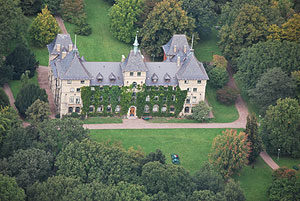 The Swedish University of Agricultural Sciences (SLU) held a one day symposium on agro-ecosystems in Pakistan at its Alnarp Campus on Wednesday 28 November 2012. This mini-symposium highlighted agricultural sciences in Pakistan, the challenges and opportunities. It furthermore aimed to identify areas of collaboration of research in Pakistan and Sweden.
The Swedish University of Agricultural Sciences (SLU) held a one day symposium on agro-ecosystems in Pakistan at its Alnarp Campus on Wednesday 28 November 2012. This mini-symposium highlighted agricultural sciences in Pakistan, the challenges and opportunities. It furthermore aimed to identify areas of collaboration of research in Pakistan and Sweden.
The direct incentive for the initiative is the fact that SLU and other Swedish universities have hosted a large number of PhD students over the last five years. Many of these new PhDs will return back to Pakistan and set up their own research group.
The symposium gave an opportunity for these PhDs to present future directions of their research to a broad audience and to shape collaborative contacts. A keynote talk was held by Professor Farooq from the Faculty of Agriculture at Faisalabad University of Agriculture. Dr Farooq has a broad experience and a impressive track record on agro-ecosystem research in Pakistan and abroad. For more information, please contact Dr. Teun Dekker.
• Oslo conference on Imagining Multiple Indias in India and beyond
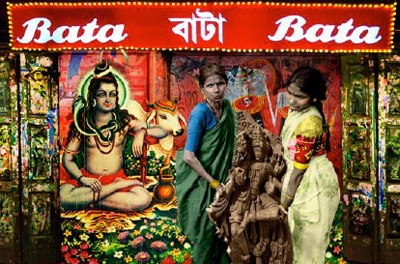
 The Museum of Cultural History, University of Osloorganises a conference on ”The Indian Phantasm: Imagining Multiple Indias in India and Beyond” 10–11 December 2012. Venue: Museum of Cultural History, Frederiksgate 2, Oslo.
The Museum of Cultural History, University of Osloorganises a conference on ”The Indian Phantasm: Imagining Multiple Indias in India and Beyond” 10–11 December 2012. Venue: Museum of Cultural History, Frederiksgate 2, Oslo.
The idea is to identify and analyze the multiple narratives, representations and imaginaries of contemporary India, both within and beyond its borders. Papers featuring analysis of Indian material culture, consumer goods, Bollywood and other Indian film production, calendar art, fashion, posters, photography, soap operas, advertising, music videos, TV-shows, theater, performance, religious expressions and spiritual tourism are particularly welcome. The idea is to get a grasp of what the phantasm of contemporary India might consist of and how it could be creatively approached in ethnographic research and what it can tell us about the current Indian postcolonial condition. The conference will feature several ethnographic movies and therefore theoretical papers on ethnographic filmmaking and the use of photography and image in ethnography are also of interest. Featured ethnographic movies include FlyoverDelhi by Paolo Favero & Angelo Fontana (2004), India Deluxe: Dreams of Luxury, Realities of Life by Tereza Kuldova & Arash Taheri (2012), and Beggars of Lahore by Sheba Saeed (2010). Other invited speakers include Rachel Dwyer, Sanjay Srivastava, Caroline Osella, and Jean-Claude Galey. More information.

 Dr. Jishnu Shankar, Senior Lecturer at the Department of Asian Studies, University of Texas at Austin, USA, holds an open lecture at Oslo University on Wednesday 12 December 2012, 14.15 – 16.00. Jishnu Shankar will be in Oslo in week 50 within the frame of the Oslo – Austin exchange programme. Venue: Sem.room 10, PAM, Faculty of Humanities, University of Oslo.
Dr. Jishnu Shankar, Senior Lecturer at the Department of Asian Studies, University of Texas at Austin, USA, holds an open lecture at Oslo University on Wednesday 12 December 2012, 14.15 – 16.00. Jishnu Shankar will be in Oslo in week 50 within the frame of the Oslo – Austin exchange programme. Venue: Sem.room 10, PAM, Faculty of Humanities, University of Oslo.
Aughaṛs have historically been regarded as a set of transgressive ascetics in India who dwell in cremation grounds, away from attractions of a domestic life, and have practices that are looked at fearfully by the general milieu of lay Hindu practitioners, especially those who belong to the Brahmanical orthodoxy. Such a view can be traced in the classical Sanskrit literature, as well as in the colonial accounts of them. However, in recent times a more benign social face of “Aghor” has emerged starting with Baba Kinaram, founder of the Kinaram Sthal in Varanasi in the 17th century, but specifically with reference to the work of Baba Bhagawan Ram Ji.
Aghoreshwar Mahaprabhu Baba Bhagawan Ram Ji, a well-established saint of the holy city of Varanasi in north India belonging to Baba Kinaram’s lineage, initiated many changes into the Aghor tradition. As a result of his efforts this tradition has not only become accepted in the city of Banaras, but it has also become respected, largely because of its contribution towards the treatment of leprosy patients, simplification of marriage and death rituals, the education of children, and many other kinds of social work.
 On Thursday 14 February 2013, the Nordic Center in India (NCI) and University of Helsinki organize a seminar on “Ethnographic Fieldwork in Sikh Diasporas”. The speakers include Prof. Hanna Snellman (Ethnology) at University of Helsinki, Dr. Laura Hirvi (Ethnology) from University of Jyväskylä, and Dr. Kristina Myrvold (Religious Studies) from Lund University. Venue: Room F205, Unioninkatu 38 F, Department of Philosophy, History, Culture and Art Studies, University of Helsinki, Finland. The seminar is organized in connection with the NCI Board Meeting the following day, on Friday 15 February, 2013. See the seminar program.
On Thursday 14 February 2013, the Nordic Center in India (NCI) and University of Helsinki organize a seminar on “Ethnographic Fieldwork in Sikh Diasporas”. The speakers include Prof. Hanna Snellman (Ethnology) at University of Helsinki, Dr. Laura Hirvi (Ethnology) from University of Jyväskylä, and Dr. Kristina Myrvold (Religious Studies) from Lund University. Venue: Room F205, Unioninkatu 38 F, Department of Philosophy, History, Culture and Art Studies, University of Helsinki, Finland. The seminar is organized in connection with the NCI Board Meeting the following day, on Friday 15 February, 2013. See the seminar program.

 The Asian Dynamics Initiative at the University of Copenhagen organises a conference on “Growth: Critical perspectives from Asia”, 13-14 June, 2013.
The Asian Dynamics Initiative at the University of Copenhagen organises a conference on “Growth: Critical perspectives from Asia”, 13-14 June, 2013.
Over the past fifty years we have witnessed phenomenal economic growth in Asia, lifting millions of people out of poverty, and propelling many Asian nations to premier ranks in the global order, but as the social and ecological costs become more apparent, economic and demographic growth looms as both promise and peril. The concept of growth has not only been central to economic theory and ecological critique, but also to social and cultural theories of societal and civilizational transformation that increasingly challenges universalizing Western notions of modernity.
This conference critically examines the notion of growth and the ways in which it is shaping social-political landscapes in Asia. We define and question growth in this very broad sense, implying that quantitative changes are inevitably accompanied by qualitative transformations, and paying equal attention to the intricate interconnectedness of naturally occurring growth and human interference as well as to its limitations, stagnation, decline and renewal. Understood in this extended sense, the term and related concepts can be fruitfully used to explore social, economic and cultural processes across time and space within the macro-region of Asia (and beyond) from cross-disciplinary perspectives. Based on this notion of growth not as an autonomous, self-determined entity but as the outcome of close and constant interaction between nature and purposeful human action, at this conference we propose to rethink and scrutinize this concept from an Asian perspective and from multi-disciplinary vantage points – cultural, economic and social.
Abstracts including title, name and affiliation should be sent to marie.yoshida@nias.ku.dk. The deadline for submitting abstracts is January 15, 2013. More information.
See SASNET’s page, http://www.sasnet.lu.se/lectures-in-scandinavia
Conferences and workshops outside Scandinavia

 The USID Gurukul 2012 is 3rd in a series of Gurukul organised by USID Foundation in Partnership with the Design Program & the Dept. of Humanities and Social Sciences of IIT Kanpur. It is going on 8–15 December 2012 at the Indian Institute of Technology (IIT) Kanpur. USID Gurukul is inspired by ”Gurukul”, a school concept from ancient India. The event will bring together around 50 students (Shishyas) selected from India as well as other countries representing the students and professionals from the disciplines of Design, Technology, Management and Social Sciences. The Shishyas will attend the Gurukul for a period of 2 weeks and will learn under the mentorship of eminent academicians & researchers and experienced practitioners (Gurus) representing a variety of institutes, organizations and industry domains. To encourage a collaborative and immersive learning experience, the Shishyas will be divided into teams of 6 to 8 with each team having a mix of design, technology, management and social science students and professionals as well as well representatives from the local population. More information here.
The USID Gurukul 2012 is 3rd in a series of Gurukul organised by USID Foundation in Partnership with the Design Program & the Dept. of Humanities and Social Sciences of IIT Kanpur. It is going on 8–15 December 2012 at the Indian Institute of Technology (IIT) Kanpur. USID Gurukul is inspired by ”Gurukul”, a school concept from ancient India. The event will bring together around 50 students (Shishyas) selected from India as well as other countries representing the students and professionals from the disciplines of Design, Technology, Management and Social Sciences. The Shishyas will attend the Gurukul for a period of 2 weeks and will learn under the mentorship of eminent academicians & researchers and experienced practitioners (Gurus) representing a variety of institutes, organizations and industry domains. To encourage a collaborative and immersive learning experience, the Shishyas will be divided into teams of 6 to 8 with each team having a mix of design, technology, management and social science students and professionals as well as well representatives from the local population. More information here.
 |
 |
 An international workshop on “Spaces of law: territories, boundaries, corridors and beyond” will be held in Kolkata, India, 11–13 December 2012. The workshop seeks to examine the role of space – geographical, imagined and claimed, in shaping ideas and practices of imperial law, and those subject to that law. It is organised jointly by the Centre for Studies in Social Sciences, Calcutta (CSSSC), and Plymouth University, UK. The convenors are Professor Lakshmi Subramanian in Kolkata and Dr. Nandini Chatterjee in Plymouth. Deadline for submitting abstracts is 13 July 2012.More information.
An international workshop on “Spaces of law: territories, boundaries, corridors and beyond” will be held in Kolkata, India, 11–13 December 2012. The workshop seeks to examine the role of space – geographical, imagined and claimed, in shaping ideas and practices of imperial law, and those subject to that law. It is organised jointly by the Centre for Studies in Social Sciences, Calcutta (CSSSC), and Plymouth University, UK. The convenors are Professor Lakshmi Subramanian in Kolkata and Dr. Nandini Chatterjee in Plymouth. Deadline for submitting abstracts is 13 July 2012.More information.
 This is one of the four academic events planned within the British Arts and Humanities Research Council (AHRC) funded research network ‘Subjects of law: rightful selves and the legal process in imperial Britain and the British empire’. The network brings together scholars of history, law and literature, with specialist knowledge of imperial Britain, colonial North America and the Atlantic world, the dominions of Australia and New Zealand, Mandate Palestine, colonial west Africa, India, Malaya and Hong Kong to investigate how, in the process of demanding and defending their rights, people from a huge variety of socio-cultural backgrounds were compelled to translate their beliefs, traditions, practices, interests, claims and finally, themselves so as to fit recognisable categories within the legal systems of the British empire.(More information about the network)
This is one of the four academic events planned within the British Arts and Humanities Research Council (AHRC) funded research network ‘Subjects of law: rightful selves and the legal process in imperial Britain and the British empire’. The network brings together scholars of history, law and literature, with specialist knowledge of imperial Britain, colonial North America and the Atlantic world, the dominions of Australia and New Zealand, Mandate Palestine, colonial west Africa, India, Malaya and Hong Kong to investigate how, in the process of demanding and defending their rights, people from a huge variety of socio-cultural backgrounds were compelled to translate their beliefs, traditions, practices, interests, claims and finally, themselves so as to fit recognisable categories within the legal systems of the British empire.(More information about the network)
 An International conference on Advances in Information and Communication Technology for Emerging Regions (ICTer) will be held in Colombo, Sri Lanka, 13–14 December 2012. It is the successor to the seminal International Information Technology conferences (IITC) held in Sri Lanka since 1998, providing a platform where research done in ICT is presented by both local and foreign computer scientists and IT professionals. Venue: Bandaranaike Memorial International Conference Hall (BMICH), Committee Rooms, Bauddhaloka Mawatha, Colombo 07. Selected papers from the conference will be invited for publication in the ICTer Journal.
An International conference on Advances in Information and Communication Technology for Emerging Regions (ICTer) will be held in Colombo, Sri Lanka, 13–14 December 2012. It is the successor to the seminal International Information Technology conferences (IITC) held in Sri Lanka since 1998, providing a platform where research done in ICT is presented by both local and foreign computer scientists and IT professionals. Venue: Bandaranaike Memorial International Conference Hall (BMICH), Committee Rooms, Bauddhaloka Mawatha, Colombo 07. Selected papers from the conference will be invited for publication in the ICTer Journal.
The event also includes a pre-conference (12th) and a post-conference (15th) as well as high quality tutorials and workshops. A student symposium will be held at the UCSC, 35, Reid Avenue, Colombo 07, Sri Lanka on 15th December 2012. Conference papers and tutorial proposals are invited in the following five broad categories, but not limited to: Technology, Applications, Human Computer Interaction, Development Processes and Social, Legal and Ethical Issues.
More information.

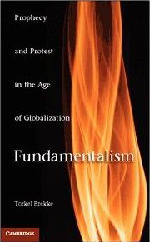
 During the New Delhi Conference Week of the International Research Network on Religion and Democracy, to be held in the Indian capital 10-14 December 2012, a workshop on Fundamentalism will be held. The workshop will be devoted to the recently published book of Norwegian Professor Torkel Brekke: Fundamentalism: Prophecy and Protest in an Age of Globalizatiom (Cambridge U.P., 2011). The workshop will take place at the Lady Shri Ram College of the University of Delhi, Lajpat Nagar IV, New Delhi, on Thursday 13 December, 16.30 – 18.00.
During the New Delhi Conference Week of the International Research Network on Religion and Democracy, to be held in the Indian capital 10-14 December 2012, a workshop on Fundamentalism will be held. The workshop will be devoted to the recently published book of Norwegian Professor Torkel Brekke: Fundamentalism: Prophecy and Protest in an Age of Globalizatiom (Cambridge U.P., 2011). The workshop will take place at the Lady Shri Ram College of the University of Delhi, Lajpat Nagar IV, New Delhi, on Thursday 13 December, 16.30 – 18.00.
 Professor Brekke from the Department of Culture Studies and Oriental Languages (IKOS), University of Oslo, has specialized on South Asian culture, religion and politics. He has published widely about the ethics of war in the South Asian civilizations. He also works on the cultural and religious transformations in the meeting of Europe and South Asia during the colonial period. He is currently involved in a wider international research project about the ethics of war in world religions. The other main research focus is the cultural and religious transformations in South Asia during the colonial period. Besides these areas, he is pursuing research in the contemporary developments in secularization, secularism and the relation between politics and religion. The workshop is sponsored by Cambridge University Press. More information.
Professor Brekke from the Department of Culture Studies and Oriental Languages (IKOS), University of Oslo, has specialized on South Asian culture, religion and politics. He has published widely about the ethics of war in the South Asian civilizations. He also works on the cultural and religious transformations in the meeting of Europe and South Asia during the colonial period. He is currently involved in a wider international research project about the ethics of war in world religions. The other main research focus is the cultural and religious transformations in South Asia during the colonial period. Besides these areas, he is pursuing research in the contemporary developments in secularization, secularism and the relation between politics and religion. The workshop is sponsored by Cambridge University Press. More information.

 The eminent Kolkata writer and journalist Ajit Roy (photo), well-known to a whole generation of Swedes interested in the development in the Indian political arena, passed away in June 2011. For more than 25 years he wrote well-informed and analytical texts from a leftist perspective in the Swedish-language magazine Sydasien, edited by Lars Eklund – now SASNET’s deputy director. Read an obituary article from EPW (November 19, 2011) written by Gabriele Dietrich.
The eminent Kolkata writer and journalist Ajit Roy (photo), well-known to a whole generation of Swedes interested in the development in the Indian political arena, passed away in June 2011. For more than 25 years he wrote well-informed and analytical texts from a leftist perspective in the Swedish-language magazine Sydasien, edited by Lars Eklund – now SASNET’s deputy director. Read an obituary article from EPW (November 19, 2011) written by Gabriele Dietrich.
On 15th December 2012, at 17.30, the first Ajit Roy Memorial Lecture will be held at Jadavpur University in Kolkata. Professor Shobhanlal Dutta Gupta will lecture on ”Tradition, Modernity and the Indian Left”. On the same occasion, a book containing a selection of Ajit Roy’s writings will be released by Dr. Ashok Mitra. All are welcome to attend this function. Venue: Indramoti Sabhagriha, National Council of Education, Jadavpur University, 188 Raja Subodh Mullick Road.
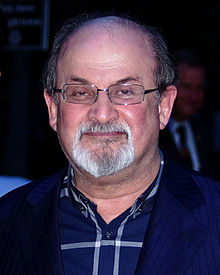 The Department of Foreign Language Education at the Middle East Technical University (METU) in Ankara, Turkey, organises it’s 20th conference on British Novelists to take place 17-18 December 2012 in Ankara. The theme of this year’s conference is ”Salman Rushdie and His Work”. Rushdie became famous with his novel ”Midnight’s Children” published in 1981 and his work since has been combining magical realism with historical fiction, being concerned with the many connections, disruptions and migrations between East and West.
The Department of Foreign Language Education at the Middle East Technical University (METU) in Ankara, Turkey, organises it’s 20th conference on British Novelists to take place 17-18 December 2012 in Ankara. The theme of this year’s conference is ”Salman Rushdie and His Work”. Rushdie became famous with his novel ”Midnight’s Children” published in 1981 and his work since has been combining magical realism with historical fiction, being concerned with the many connections, disruptions and migrations between East and West.
Keynote speaker will be Abdulrazak Gurnah, Professor of English and Postcolonial Studies, University of Kent, UK. More information.

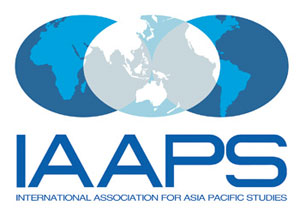 The Sixth Biennial International Conference of Indian Association for Asian & Pacific Studies will be held in Kolkata 17–19 December 2012. It is organised by the Department of South & South East Asian Studies, University of Calcutta. The convener is Prod. Lipi Ghosh, former Visiitng Indian ICCR Professor at Lund University.
The Sixth Biennial International Conference of Indian Association for Asian & Pacific Studies will be held in Kolkata 17–19 December 2012. It is organised by the Department of South & South East Asian Studies, University of Calcutta. The convener is Prod. Lipi Ghosh, former Visiitng Indian ICCR Professor at Lund University.
The theme for the conference will be ”Weaving the Asian Century: Challenges and Opportunities”, with sub themes such as ”Social Exclusion and Human Rights”, ”Swami Vivekananda through Contemporary Eyes”, ”Rise of India & China in the context of Asia-Pacific Century”, and ”West Bengal: History, Society, Culture and Contemporary Changes”.
The keynote Speaker is the renowned columnist Sunanda K. Datta- Ray, author of the award winning book”Looking East to Look West: Lee Kuan Yew’s Mission India”. Mr Datta-Ray has been a Visiting Fellow at Corpus Christi College, Oxford, and associated with Nanyang Technological University and Institute of Southeast Asian Studies, Singapore. More information about the Kolkata conference.

 On 21–22 December 2012, scholars of Duke University, Michigan State University, Johns Hopkins University, and New York University, all in the US, organise a workshop on modern Indian history, entitled ”The Long 1980s – Recovering a Lost Decade”. The workshop will be held in New Delhi and has three main focus themes: – to identify what has been characterized as the long 1980s as a pivotal turning point in India’s twentieth-century history; – to take stock of the scholarship on the areas being identified as historically constitutive of that period; – and to connect studies of cultural production with those of political practice and political economy. The workshop is supported and hosted by the American Institute of Indian Studies with funding from the Council of American Overseas Research Centers. Full details on the official website.
On 21–22 December 2012, scholars of Duke University, Michigan State University, Johns Hopkins University, and New York University, all in the US, organise a workshop on modern Indian history, entitled ”The Long 1980s – Recovering a Lost Decade”. The workshop will be held in New Delhi and has three main focus themes: – to identify what has been characterized as the long 1980s as a pivotal turning point in India’s twentieth-century history; – to take stock of the scholarship on the areas being identified as historically constitutive of that period; – and to connect studies of cultural production with those of political practice and political economy. The workshop is supported and hosted by the American Institute of Indian Studies with funding from the Council of American Overseas Research Centers. Full details on the official website.

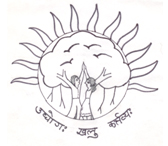 The Sudarshan Foundation Trust in India organizes an International Conference on ”Rural South Asia: Imagining Heritage and Progress” at Aurangabad, Maharashtra, India, on 4–7 January 2013. This is the second initiative from Sudarshan Foundation Trust after its successful conference held in 2009 on ”Mahatma Gandhi and Gram Swaraj: Reflections on Gandhian Ideology” (more information).
The Sudarshan Foundation Trust in India organizes an International Conference on ”Rural South Asia: Imagining Heritage and Progress” at Aurangabad, Maharashtra, India, on 4–7 January 2013. This is the second initiative from Sudarshan Foundation Trust after its successful conference held in 2009 on ”Mahatma Gandhi and Gram Swaraj: Reflections on Gandhian Ideology” (more information).
The objective of the conference is to organize a series of brainstorming sessions the results of which will be disseminated through projects for rural planning and improvement in South Asia. More information.

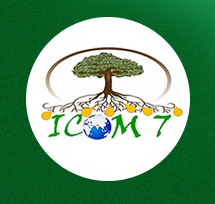 The seventh edition of the International Conference on Mycorrhiza will take place 6 – 11 January 2013 at India Habitat Centre, New Delhi, India. The conference is organised by The Indian Energy and Resources Institute (TERI) in collaboration with the Mycorrhiza network. The title of this edition of the conference is ”Mycorrhiza for All – an Under Earth Revolution”. The summit would cover various aspects of mycorrhizal symbiosis and their role in a wide range of areas covering ecosystem dynamics, nutrient cycling, gene expression, metabolic regulation, reclamation technologies, and more. Official conference website: http://www.teriin.org/events/icom/
The seventh edition of the International Conference on Mycorrhiza will take place 6 – 11 January 2013 at India Habitat Centre, New Delhi, India. The conference is organised by The Indian Energy and Resources Institute (TERI) in collaboration with the Mycorrhiza network. The title of this edition of the conference is ”Mycorrhiza for All – an Under Earth Revolution”. The summit would cover various aspects of mycorrhizal symbiosis and their role in a wide range of areas covering ecosystem dynamics, nutrient cycling, gene expression, metabolic regulation, reclamation technologies, and more. Official conference website: http://www.teriin.org/events/icom/

 The 14th Conference of the International Association for Studies in Forced Migration (IASFM) will take place in Kolkata, India 6 – 9 January 2013 and will be hosted by the Mahanirban Calcutta Research Group. This is the first time that the conference is being hosted in South Asia. The topic of the conference is ”Contested Spaces and Cartographic Challenges”, and particular focus will be on – Borders and Displacement; – Geography and economies of Displacement; – Rights, Ethics, and Institutions. Alongside traditional panel presentations, the conference will include plenaries, round-table discussions, public dialogues, film shows and cultural events. While academic contributions will be at the heart of the conference, there will also be a strong presence of policy-makers and activists since the conference seeks to influence the relevant policy discussions and civil society interventions. Read the full announcement.
The 14th Conference of the International Association for Studies in Forced Migration (IASFM) will take place in Kolkata, India 6 – 9 January 2013 and will be hosted by the Mahanirban Calcutta Research Group. This is the first time that the conference is being hosted in South Asia. The topic of the conference is ”Contested Spaces and Cartographic Challenges”, and particular focus will be on – Borders and Displacement; – Geography and economies of Displacement; – Rights, Ethics, and Institutions. Alongside traditional panel presentations, the conference will include plenaries, round-table discussions, public dialogues, film shows and cultural events. While academic contributions will be at the heart of the conference, there will also be a strong presence of policy-makers and activists since the conference seeks to influence the relevant policy discussions and civil society interventions. Read the full announcement.

 The Sikholars Conference on Sikh and Punjab Studies 2013 will be held at Stanford University in California, USA, 16–17 February 2013. The conference is sponsored by the Center for South Asia at Stanford University and the Jakara Movement.
The Sikholars Conference on Sikh and Punjab Studies 2013 will be held at Stanford University in California, USA, 16–17 February 2013. The conference is sponsored by the Center for South Asia at Stanford University and the Jakara Movement.
For the past four years, the Jakara Movement has created a forum for budding scholars and researchers, working on various projects Sikh, to come together, share, and challenge each one another. The previous Sikholars conferences has attracted young scholars from over three continents and twenty–five universities. With topics ranging from Khalistan to Unix Coding, from sex-selective abortion to diasporic literature, from Nihangs in the court of Ranjit Singh to the North American bhangra circuit, from Sikh sculpture and architecture to representations of masculinity in Punjabi films, the widest possible range of those pursuing graduate studies on Sikh-related topics is encouraged.
While all topics are welcomed and panels will be formed around their various themes, there will be two panels for special consideration. The Challenge of Caste Panel will explore the issue of caste amongst Sikh populations: From ethnography to sociology, from internet studies to musicology, from history to anthropology, any number of approaches to the question of caste, whether located in South Asia or the diaspora are welcomed. Due to the widespread interest and demand from attendees, there will also be a special panel devoted to technological entrepreneurship. This Technology and Entrepreneurship Panel will be limited to three panelists for this inaugural year. Abstracts should be submitted before 15 December 2012. More information.

 The Energy History Project at the Joint Center for History and Economics is organising a workshop on“Energy History in Asia”, on February 21-22, 2013 at Harvard University and the Massachusetts Institute of Technology. The meeting is part of an ongoing series of events on the global and comparative history of energy.
The Energy History Project at the Joint Center for History and Economics is organising a workshop on“Energy History in Asia”, on February 21-22, 2013 at Harvard University and the Massachusetts Institute of Technology. The meeting is part of an ongoing series of events on the global and comparative history of energy.
 The workshop will reexamine the history of Asia from the perspective of what might be called the “new history of energy”, an approach in the making that builds on earlier research on energy history and energy policy, in order to better account for the particular characteristics and uses of different energy sources, from fossil fuels to renewable alternatives to human and animal labor. The workshop will place energy at the center of inquiry in Asian history, and will ask how energy production and consumption interacted with larger social and environmental processes. It will also explore how a focus on energy makes it possible to reconsider well-known narratives within national and regional histories. How, for example, might the Great Game in Central Asia, the Vietnam War, Indian Independence, or the Great Leap Forward in China look when viewed from the perspective of energy? The notion of “energy” is defined broadly and the organisers welcome proposals related to Asia — also defined broadly — from across disciplines and specializations. Much of the published research in energy history has come out of studies of North America and Europe. Narratives of this sort have, however, just begun to be written for Asia. The organisers seek to bring together historians of Central, South, Southeast, and East Asia who are working on projects that speak to the concerns of this new field. The workshop opens in the afternoon on February 21 with a keynote talk by John McNeill, University Professor, Georgetown University, and will proceed into a full day of paper presentations. More information.
The workshop will reexamine the history of Asia from the perspective of what might be called the “new history of energy”, an approach in the making that builds on earlier research on energy history and energy policy, in order to better account for the particular characteristics and uses of different energy sources, from fossil fuels to renewable alternatives to human and animal labor. The workshop will place energy at the center of inquiry in Asian history, and will ask how energy production and consumption interacted with larger social and environmental processes. It will also explore how a focus on energy makes it possible to reconsider well-known narratives within national and regional histories. How, for example, might the Great Game in Central Asia, the Vietnam War, Indian Independence, or the Great Leap Forward in China look when viewed from the perspective of energy? The notion of “energy” is defined broadly and the organisers welcome proposals related to Asia — also defined broadly — from across disciplines and specializations. Much of the published research in energy history has come out of studies of North America and Europe. Narratives of this sort have, however, just begun to be written for Asia. The organisers seek to bring together historians of Central, South, Southeast, and East Asia who are working on projects that speak to the concerns of this new field. The workshop opens in the afternoon on February 21 with a keynote talk by John McNeill, University Professor, Georgetown University, and will proceed into a full day of paper presentations. More information.

 The Department of Middle East, South Asian and African Studies (MESEAS) at Columbia University in New York, USA, holds its annual conference for graduate students 28 February – 1 March 2013. The 2013 MESAAS Graduate Conference will focus on“Paradigmatic Conflict and Crisis: A Graduate Student Conference on the Middle East, South Asia, and Africa”, focusing on the notion of paradigm, a frequently used and studied concept in the humanities and social sciences, and invites students to share their successes, challenges and unanswered questions relating to the employment, reliance upon and analysis of this concept. Abstracts should be submitted before 15 January 2013. Read more.
The Department of Middle East, South Asian and African Studies (MESEAS) at Columbia University in New York, USA, holds its annual conference for graduate students 28 February – 1 March 2013. The 2013 MESAAS Graduate Conference will focus on“Paradigmatic Conflict and Crisis: A Graduate Student Conference on the Middle East, South Asia, and Africa”, focusing on the notion of paradigm, a frequently used and studied concept in the humanities and social sciences, and invites students to share their successes, challenges and unanswered questions relating to the employment, reliance upon and analysis of this concept. Abstracts should be submitted before 15 January 2013. Read more.

 The British Association for South Asian Studies (BASAS) will hold its 27th Annual Conference at the University of Leeds, 3–5 April 2013. The organisers invite proposals for whole panels as well as individual papers. As usual, proposals from the full range of disciplines reflected within the broad membership of BASAS are invited. A single panel will run for 90 minutes and may include 3-4 papers. Submissions should include a panel title and abstract together with abstracts for each of the panel papers. Extended deadline for submission of panel and paper abstracts is December 10, 2012. More information here.
The British Association for South Asian Studies (BASAS) will hold its 27th Annual Conference at the University of Leeds, 3–5 April 2013. The organisers invite proposals for whole panels as well as individual papers. As usual, proposals from the full range of disciplines reflected within the broad membership of BASAS are invited. A single panel will run for 90 minutes and may include 3-4 papers. Submissions should include a panel title and abstract together with abstracts for each of the panel papers. Extended deadline for submission of panel and paper abstracts is December 10, 2012. More information here.

 In April of 2013 (exact date to be announced), The International Institute for Asian Studies (IIAS) will organise a seminar on ‘Asian Cities: Colonial to Global’ in Leiden, the Netherlands. The organisers welcome contributions from the fields of architecture, urbanism, geography, area studies, history, linguistics, religious studies, social science, anthropology, etc., but please remember that the point of departure will always be the built environment. Note also that this seminar is not intended to be an investigation into theoretical issues relating to the field of postcolonialism, rather it seeks to investigate more practical issues relating to the more literally ‘post-colonial’ (in the sense of the era following independence from erstwhile colonial or imperial powers), and the effects this has had on the built environment. Contributions are invited that cover the regions of East, Southeast and South Asia (including countries that were not colonized (such as Japan or Thailand) or were only partially colonized (such as China).
In April of 2013 (exact date to be announced), The International Institute for Asian Studies (IIAS) will organise a seminar on ‘Asian Cities: Colonial to Global’ in Leiden, the Netherlands. The organisers welcome contributions from the fields of architecture, urbanism, geography, area studies, history, linguistics, religious studies, social science, anthropology, etc., but please remember that the point of departure will always be the built environment. Note also that this seminar is not intended to be an investigation into theoretical issues relating to the field of postcolonialism, rather it seeks to investigate more practical issues relating to the more literally ‘post-colonial’ (in the sense of the era following independence from erstwhile colonial or imperial powers), and the effects this has had on the built environment. Contributions are invited that cover the regions of East, Southeast and South Asia (including countries that were not colonized (such as Japan or Thailand) or were only partially colonized (such as China).
 Please note that neither the IIAS nor TU Delft will be in a position to help fund contributors’ trips to the seminar. The intention is however to gather a selection of the papers into a book which will be a fully peer-reviewed publication. The seminar series has a good track record at converting previous events into peer-reviewed publications: Seminar number two (Delft 2010) resulted in Aspects of Urbanization in China: Shanghai, Hong Kong, Guangzhou, published by the University of Amsterdam Press in spring 2012, and seminar number three (Shanghai 2011) is currently under peer review and is scheduled to be published as a special issue of Footprint journal in spring 2013.
Please note that neither the IIAS nor TU Delft will be in a position to help fund contributors’ trips to the seminar. The intention is however to gather a selection of the papers into a book which will be a fully peer-reviewed publication. The seminar series has a good track record at converting previous events into peer-reviewed publications: Seminar number two (Delft 2010) resulted in Aspects of Urbanization in China: Shanghai, Hong Kong, Guangzhou, published by the University of Amsterdam Press in spring 2012, and seminar number three (Shanghai 2011) is currently under peer review and is scheduled to be published as a special issue of Footprint journal in spring 2013.
Abstracts of approximately 200 words should be submitted to Dr Gregory Bracken at the IIAS: gregory@cortlever.com, no later than January 31, 2013. Dr Bracken will also answer enquiries about the seminar. More information.

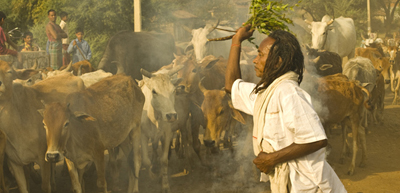 The Center for South Asian Studies at the University of Hawaiiat Manoa, USA, invites paper and panel proposals on aspects related to its 30th Annual Spring Symposium on “Sensing South Asia”. The conference will take place 15–17 April 2013 in Honolulu.
The Center for South Asian Studies at the University of Hawaiiat Manoa, USA, invites paper and panel proposals on aspects related to its 30th Annual Spring Symposium on “Sensing South Asia”. The conference will take place 15–17 April 2013 in Honolulu.
What happens when we approach social and natural worlds, the body, and affect through the senses? How do disciplinary and interdisciplinary understandings of South Asia change if we consider that what and how we feel, hear, taste, smell, touch, see, and intuit are culturally and historically mediated? The symposium invites scholars, artists, and practitioners to engage with the senses as portals to time, place, and social, cultural, and natural processes in South Asia. Of particular interest is research grounded in sensory relations and intersensory modalities that can generate new questions for various disciplines. In this symposium, the organisers want to explore what South Asian societies – and their histories, philosophies, everyday rituals and practices, and political economies – can offer to emerging theories and methods in sensory studies. Participants are encouraged to perform or use new media as part of their presentations. Deadline to submit proposals is January 15, 2013. More information.

 The Cities Network Campaign, along with All India Institute of Local Self Government (AIILSG) and World resources Institute, India (WRI) is organizing the South Asian Cities Summit 2013 on 17–18 April in New Delhi. The Summit aims to create a platform and bring together mayors & commissioners from various south Asian cities (such as India, Nepal, Bangladesh, Bhutan, etc), subject experts, international/ funding organisations/investors working in the area of climate change, technology providers and European, South Asian & other part of world businesses excelling in the sector to discuss the issues and the way forward and encourage appropriate technology interventions. The delegation of 250-300 participants would include business heads, financial expert and decision makers and would thus initiate business dialogues, collaboration proposals and prospective joint ventures. More information.
The Cities Network Campaign, along with All India Institute of Local Self Government (AIILSG) and World resources Institute, India (WRI) is organizing the South Asian Cities Summit 2013 on 17–18 April in New Delhi. The Summit aims to create a platform and bring together mayors & commissioners from various south Asian cities (such as India, Nepal, Bangladesh, Bhutan, etc), subject experts, international/ funding organisations/investors working in the area of climate change, technology providers and European, South Asian & other part of world businesses excelling in the sector to discuss the issues and the way forward and encourage appropriate technology interventions. The delegation of 250-300 participants would include business heads, financial expert and decision makers and would thus initiate business dialogues, collaboration proposals and prospective joint ventures. More information.

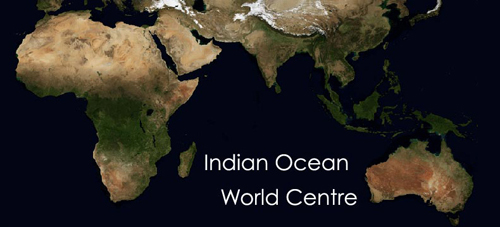 The Indian Ocean World Centre (IOWC) at the McGill University in Montreal, Canada, is organizing a conference on “Histories of Medicine in the Indian Ocean World”, 26-27 April 2013.
The Indian Ocean World Centre (IOWC) at the McGill University in Montreal, Canada, is organizing a conference on “Histories of Medicine in the Indian Ocean World”, 26-27 April 2013.
Papers are invited that address any aspect of medicine in the region of the Indian Ocean, including Northeast, East and South Africa, the Middle East, the Indian Ocean islands, South, Southeast, and East Asia, in any historical period. The aim of the conference is to interrogate the concept of the Indian Ocean as a world using the exchange of medical goods, texts, instruments and ideas as a lens through which to examine how far the region may be regarded as a cultural entity. As well as being an article of trade, medicine is associated with religious, spiritual, and cultural ideas about the body and its relation to the environment. These ideas both govern the acceptance, modification, or rejection of medicines and medical ideas and are altered by them. Medical exchanges can thus be used to provide a cultural perspective on historical events and trends such as the spread of Islam and other faiths, the movement of migrant and diaspora communities, free and enslaved, and the rise and fall of empires in the region. The conference being multidisciplinary, papers from geography, sociology, anthropology and area studies as well as the history of medicine and science are welcome. Deadline for submission of abstracts is 14 January 2013. More information.
• Singapore workshop on Violence and Urban Life in South Asia

 The Asia Research Institute (ARI) at the National University of Singapore organises a workshop on “Violence, Insurgencies, Deceptions: Conceptualizing Urban Life in South Asia”, during 6-7 May 2013.
The Asia Research Institute (ARI) at the National University of Singapore organises a workshop on “Violence, Insurgencies, Deceptions: Conceptualizing Urban Life in South Asia”, during 6-7 May 2013.
Urban life in South Asia has encompassed volatile conditions catalyzed not only by globalization, urbanization and neoliberal economic restructuring, but also by dramatic changes in the national political-economy, for instance the emergence of new electoral democracies that disrupt established norms of rule and privilege, the rise of xenophobic and exclusivist agendas that are cast within nationalist discourses, and new political rationalities that affect state transformations and urban policy. New forms of representation, plebian identities and ethnic markings coalesce in ways that disrupt the ideal vision of the modern, secular city. Alongside the new politics of xenophobia in which violence is an integral part of public culture sits the rhetoric of entitlements and aspirations of the phantom urban majority who define their stakes through contradictory and competing claims to the city.
This multidisciplinary workshop explores the nature of and relationship between violence and insurgent practices and the limits and slippages of state sovereignty that are constituted in the making of the built and social environments. The conference approach the political sphere in urban South Asia as a dynamic embedded in the lived conditions of city life and buttressed by the voices of refusal, separation, resistance and uncertainty. Submissions are invited of papers from young and established scholars and especially those who are located in South Asia. Submissions are welcomed across disciplines such as history, sociology, anthropology, cultural studies, film and media studies, and geography. The deadline for paper proposals is January 15, 2013. More information.

 The Conference on the Study of Religions of India (CSRI) will hold its Annual Meeting at Drew University in Madison, New Jersey, USA, 27 – 30 June 2013. The conference theme is “Not Quite Divine: Co-stars and Supporting Casts in South Asian Religions” and the deadline for submission of abstract proposals is March 1, 2013.
The Conference on the Study of Religions of India (CSRI) will hold its Annual Meeting at Drew University in Madison, New Jersey, USA, 27 – 30 June 2013. The conference theme is “Not Quite Divine: Co-stars and Supporting Casts in South Asian Religions” and the deadline for submission of abstract proposals is March 1, 2013.
Possible topics related to the conference theme include investigations of a range of demi-deities, saints, spirits, ghosts, and demons. Papers may analyze near divine entities as described, invoked, and/or experienced in oral and textual narrative; artistic, musical, and theatrical expression; and ritual, mystical, and possession practice. Participants might also examine debates regarding the divine natures of saintly humans or the processes of apotheosis involving – but not limited to – human heroes, movie stars, and topographical features.
CSRI is a forum of exchange for scholars engaged in the academic study of the religious traditions of India in both native and diasporic contexts. It provides scholars a leisurely, collegial environment in which to present their work. Emphasis will be placed on informality among peers. Committed to critical and creative inquiry, the conference is not an advocacy forum for the religions of India and does not endorse or proscribe a particular point of view. More information.



 The South Asia Research Institute, at the Research School of Asia and the Pacific at the Australian National University in Canberra will host a workshop on “South Asian Childhoods: Contemporary and Historical Perspectives” on 18–19 July 2013. The workshop aims to provide an interdisciplinary platform for scholars studying diverse childhoods in South Asia, and also to enrich the understanding of contemporary children’s lives through historical perspectives. It will locate children in important historical and social changes in contemporary India while foregrounding children’s stories and agency and bring together previously disparate threads of different disciplinary approaches to children and childhood, allowing the participants to identify and develop convergences, conflicts, and aspects that may have been over-looked by one discipline, but explored in another. Abstracts should be submitted before 10 January 2013.More information.
The South Asia Research Institute, at the Research School of Asia and the Pacific at the Australian National University in Canberra will host a workshop on “South Asian Childhoods: Contemporary and Historical Perspectives” on 18–19 July 2013. The workshop aims to provide an interdisciplinary platform for scholars studying diverse childhoods in South Asia, and also to enrich the understanding of contemporary children’s lives through historical perspectives. It will locate children in important historical and social changes in contemporary India while foregrounding children’s stories and agency and bring together previously disparate threads of different disciplinary approaches to children and childhood, allowing the participants to identify and develop convergences, conflicts, and aspects that may have been over-looked by one discipline, but explored in another. Abstracts should be submitted before 10 January 2013.More information.
 The Thirteenth biannual European Society for Central Asian Studies (ESCAS) will be held at Nazarbayev University in Astana, Kazakhstan, 5–6 August 2013. The Conference will be hosted jointly by Nazarbayev University and the R. B. Suleimeinov Institute of Oriental Studies of the Kazakhstan Academy of Sciences.
The Thirteenth biannual European Society for Central Asian Studies (ESCAS) will be held at Nazarbayev University in Astana, Kazakhstan, 5–6 August 2013. The Conference will be hosted jointly by Nazarbayev University and the R. B. Suleimeinov Institute of Oriental Studies of the Kazakhstan Academy of Sciences.
Proposals are invited for individual papers, panels and round-table discussions, and can be related to all aspects of research in the arts, humanities and social sciences on Central Asia; the republics of Kazakhstan, Kyrgyzstan, Tajikistan, Turkmenistan and Uzbekistan, together with Xinjiang, Mongolia, Afghanistan and adjacent regions of Russia, China, Iran, South Asia and the Caucasus.
Scholars and practitioners of anthropology, archaeology, architecture, art & art history, cinema, development studies, economics & finance, history, musicology, philology, political science, sociology and other related disciplines are encouraged to participate. Panel proposals which will cross disciplinary boundaries, bringing together experts from different fields, are particularly welcomed.
 The theme of the 2013 conference is “The Steppe and the Sown”. This is to encourage scholars to explore both the many complexities implied by the concepts of pastoral nomadism and sedentary farming and the complex interaction between peoples typically characterized by these concepts in the course of history. It also reflects important themes in the history of Astana itself. The deadline for proposals is February 28, 2013. More information.
The theme of the 2013 conference is “The Steppe and the Sown”. This is to encourage scholars to explore both the many complexities implied by the concepts of pastoral nomadism and sedentary farming and the complex interaction between peoples typically characterized by these concepts in the course of history. It also reflects important themes in the history of Astana itself. The deadline for proposals is February 28, 2013. More information.


 Papers are invited for the 3rd International Congress of Bengal Studies scheduled to be held 19-22 November, 2013. This 3rd Congress will be hosted by the University of Calcutta, Kolkata, India. Papers on all the areas of Bengal Studies, including, but not limited to, Literature and Criticism, Comparative Literature, Linguistics, Folklore, Cultural Studies, Media Studies, History, Economics, Sociology, Fine Arts, Philosophy, Anthropology, Archaeology, Museulogy are invited. Papers should be either in Bengali or in English.
Papers are invited for the 3rd International Congress of Bengal Studies scheduled to be held 19-22 November, 2013. This 3rd Congress will be hosted by the University of Calcutta, Kolkata, India. Papers on all the areas of Bengal Studies, including, but not limited to, Literature and Criticism, Comparative Literature, Linguistics, Folklore, Cultural Studies, Media Studies, History, Economics, Sociology, Fine Arts, Philosophy, Anthropology, Archaeology, Museulogy are invited. Papers should be either in Bengali or in English.
Last date for submission of paper proposal/abstract (800-1000 words) is 31st December, 2012. Abstracts will be received only through email to icbs2013@gmail.com. An abstract is expected to give a outline of the primary material of study/survey; approach/methodology adopted; survey of works done by other scholars so far in the concerned area; and, finally, how the proposed paper adds to the existing knowledge. Abstract in Bengali must be sent as a PDF document.
 The organizers may arrange for a few scholarships for students covering travel and registration costs. Students interested to be considered for this scholarship must submit their full paper, along with the abstract, by 31st December, 2012. More information.
The organizers may arrange for a few scholarships for students covering travel and registration costs. Students interested to be considered for this scholarship must submit their full paper, along with the abstract, by 31st December, 2012. More information.
• Other conferences connected to South Asian studies all over the World
See SASNET’s page, http://www.sasnet.lu.se/conferences/conferences
South Asia related culture

 The Allama Iqbal Seminar 2012 was held on 10 November 2012 at Copenhagen University. As usual it was arranged jointly by Iqbal Academy Scandinavia (IAS) and Islamisk-Kristent Studiecenter (IKS). The theme of the event was The Role of Sufism in Modern Islam.
The Allama Iqbal Seminar 2012 was held on 10 November 2012 at Copenhagen University. As usual it was arranged jointly by Iqbal Academy Scandinavia (IAS) and Islamisk-Kristent Studiecenter (IKS). The theme of the event was The Role of Sufism in Modern Islam.
Professor Mustansir Mir, head of the Centre Islamic Studies, Youngstown State University, Ohio, USA, spoke on “Was Iqbal a Sufi”, quoting here and there beautiful verses of Allama Dr. Muhammad Iqbal. Being a fine and one of the top Iqbal scholars, the audience was overwhelmed by the magic of Iqbal’s poetry mixed with the stylish presentation of Mustansir Mir. Professor Javed Majeed, Director of Comparative Literature Programme, Department of English Language and Literature, Kings College, London spoke on the topic Iqbal, Sufism and Post Colonialism, and PhD candidate Iram Nisa Asif from the Department of Cross-Cultural and Regional Studies, University of Copenhagen, presented a well prepared speech on the topicThe Taste of Sufism: Dhikr and Social Cohesion in Danish Sufi Circles. Read more about the 2012 Iqbal Seminar in Copenhagen.

 The 12th edition of River to River Florence Indian Film Festival is held 7–13 December 2012 in Florence, Italy. The festival focuses on 2011 and 2012 features, shorts and documentaries from and about India.
The 12th edition of River to River Florence Indian Film Festival is held 7–13 December 2012 in Florence, Italy. The festival focuses on 2011 and 2012 features, shorts and documentaries from and about India.
 For the centenary of Indian cinema that very first film, Raja Harishchandra by Dadasaheb Phalke, will be screened.
For the centenary of Indian cinema that very first film, Raja Harishchandra by Dadasaheb Phalke, will be screened.
Among the guest stars: Amitabh Bachchan (photo), Anurag Kashyap and Imtiaz Ali.
The River to River festival, under the Patronage of the Embassy of India in Rome, is the first festival in the world entirely devoted to films from and about India. New for this year is that besides the Bitebay Audience Award, the festival announces the new “Piaggio Foundation Award” for the feature film category. The jury of the award will be composed by a special committee of the Piaggio Foundation. The award, given to the director of the winning feature film by the President of Piaggio Vehicles Private Ltd of Pune, will be the new Vespa LX125 just launched on the Indian market.
Full information on the festival website.

 Kristina Borgkrans danced and talked about Indian traditional dance at Brokiga Bengalen Butik on Wednesday 7 November 2012. During her performance, Kristina told stories about the elephant god Ganesha and goddesses Saraswati and Kali, as well as gave the audience an exciting chance to try out the symbolic mudras – the intricate hand movements of Indian dance.
Kristina Borgkrans danced and talked about Indian traditional dance at Brokiga Bengalen Butik on Wednesday 7 November 2012. During her performance, Kristina told stories about the elephant god Ganesha and goddesses Saraswati and Kali, as well as gave the audience an exciting chance to try out the symbolic mudras – the intricate hand movements of Indian dance.
Kristina Borgkrans trained at the The Royal Swedish Ballet School and at the Cullberg Ballet Theatre School in Stockholm, and she has studied under masters of classical Indian dance in India and Paris. Within Indian dance, she has mainly specialized in Kuchipudi, with its origin in rural areas of Andra Pradesh, but she have also studied the more well-known Bharata Natyam. Kristina has performed in India, USA, Russia, France, as well as in the Nordic countries.
Download event poster (in Swedish only).
New and updated items on SASNET web site

 On 9th November 2012, The Swedish Committee for Afghanistan (SCA) released a report entitled “Missing the target – a report on Sweden’s support for women, peace and security in Afghanistan”, written by Ann Wilkens on the initiative of the Swedish Committee for Afghanistan, Woman to Woman and Operation 1325. The background of the report is the fact that despite pledges and contributions from Sweden and the international community in order to protect and promote women’s rights and participation in Afghanistan, very little has changed for Afghan women. Recent years has seen a backlash regarding many previous improvements and it is women who most clearly shows their concern over the military withdrawal in 2014.
On 9th November 2012, The Swedish Committee for Afghanistan (SCA) released a report entitled “Missing the target – a report on Sweden’s support for women, peace and security in Afghanistan”, written by Ann Wilkens on the initiative of the Swedish Committee for Afghanistan, Woman to Woman and Operation 1325. The background of the report is the fact that despite pledges and contributions from Sweden and the international community in order to protect and promote women’s rights and participation in Afghanistan, very little has changed for Afghan women. Recent years has seen a backlash regarding many previous improvements and it is women who most clearly shows their concern over the military withdrawal in 2014.
The report has been commissioned by a consortium of Swedish NGOs consisting of Swedish Committee for Afghanistan (SCA), the Woman to Woman Foundation and Operation 1325. The objective is to analyse Sweden’s role in Afghanistan, based on its National Action Plan (NAP) for the implementation of UNSCR 1325.
About the author: Ann Wilkens is former Swedish ambassador to Pakistan and Afghanistan (2003-07) and former chair of SCA (2007-09). She is also a member of the Advisory Panel of the Afghanistan Analysts Network (AAN) and has published a number of papers and reports on the Pakistan/Afghanistan region. More information.

 In September 2012, the fourth volume of the five volume Brill’s Encyclopedia of Hinduism was published. It has been edited by Prof. Knut A. Jacobsen, University of Bergen, Norway (Editor-in-Chief for the entire series of Brill’s Encyclopedia of Hinduism), assisted by Dr. Helene Basu, University of Münster, Germany, Dr. Angelika Malinar, University of Zürich, Switzerland, and Dr. Vasudha Narayanan, University of Florida, USA.
In September 2012, the fourth volume of the five volume Brill’s Encyclopedia of Hinduism was published. It has been edited by Prof. Knut A. Jacobsen, University of Bergen, Norway (Editor-in-Chief for the entire series of Brill’s Encyclopedia of Hinduism), assisted by Dr. Helene Basu, University of Münster, Germany, Dr. Angelika Malinar, University of Zürich, Switzerland, and Dr. Vasudha Narayanan, University of Florida, USA.
Volume IV of Brill’s Encyclopedia of Hinduism presents a historical overview of Hinduism, covering significant periods from the Indus Civilization to contemporary India. In addition, the volume features more than 30 biographies dedicated to important figures of pre-19th century religious poets, teachers, and saints, alphabetically arranged. Special attention is given to the interchanges between Hinduism and other religions and traditions, and a separate section examines the connections between Hinduism and contemporary issues such as ethics, ecology, the Internet, tourism, and New Age spirituality. More information.
• Swedish departments where research on South Asia is going on
Constantly added to the list of research environments at Swedish universities, presented by SASNET. The full list now includes nearly 300 departments, with detailed descriptions of the South Asia related research and education taking place! See the full list of departments here: http://www.sasnet.lu.se/institutions/reserch-environments
• Useful travelling information
Look at our Travel Advice page. Updated travel advises from the The British Foreign & Commonwealth Office about safety aspects on travelling to the countries of South Asia.
Best regards
Lars Eklund
Deputy director/webmaster

 For the sixth consecutive year, the Sweden India Nobel Memorial Week (SINMW) was held in India during the period 27 October – 4 November 2012. This high-profile event was organized by the Embassy of Sweden in cooperation with Exportrådet, Invest:Sweden and Swedish Energy Agency; but also companies – ABB, Atlas Copco, Ericsson, IKEA, Oriflame, SAAB, Sandvik, Scania, SEB, Tetrapak, Volvo and Volvo Cars. The theme for 2012 was The Energy of Innovations: Co-creating the Future, and it will take place in Mumbai, Pune, Bengaluru, Chennai, Hyderabad and New Delhi.
For the sixth consecutive year, the Sweden India Nobel Memorial Week (SINMW) was held in India during the period 27 October – 4 November 2012. This high-profile event was organized by the Embassy of Sweden in cooperation with Exportrådet, Invest:Sweden and Swedish Energy Agency; but also companies – ABB, Atlas Copco, Ericsson, IKEA, Oriflame, SAAB, Sandvik, Scania, SEB, Tetrapak, Volvo and Volvo Cars. The theme for 2012 was The Energy of Innovations: Co-creating the Future, and it will take place in Mumbai, Pune, Bengaluru, Chennai, Hyderabad and New Delhi.
 Except for nationals from seven countries, including China, Pakistan and Bangladesh, India has relaxed tourist visa rules — the two-month cooling off period between two visits has been lifted. Thisis reported by The Hindu on 4th December 2012. “The government has reviewed the provision relating to two months gap between two visits of a foreign national to India on a tourist visa…it has been decided to lift the restriction of two month gap on re-entry of foreign nationals coming to India except in the case of nationals of Afghanistan, China, Iran, Pakistan, Iraq, Sudan, Bangladesh, foreigners of Pakistan and Bangladesh origins and Stateless persons,” the Indian Home Ministry said in a statement. The move was initiated by the Prime Minister’s Office (PMO) in early 2012.
Except for nationals from seven countries, including China, Pakistan and Bangladesh, India has relaxed tourist visa rules — the two-month cooling off period between two visits has been lifted. Thisis reported by The Hindu on 4th December 2012. “The government has reviewed the provision relating to two months gap between two visits of a foreign national to India on a tourist visa…it has been decided to lift the restriction of two month gap on re-entry of foreign nationals coming to India except in the case of nationals of Afghanistan, China, Iran, Pakistan, Iraq, Sudan, Bangladesh, foreigners of Pakistan and Bangladesh origins and Stateless persons,” the Indian Home Ministry said in a statement. The move was initiated by the Prime Minister’s Office (PMO) in early 2012.